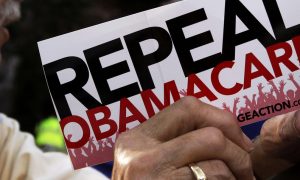Insurance giant Aetna’s announcement this week that it would sharply curb its participation in the insurance exchanges set up under the Affordable Care Act was seen by some as payback to the Obama administration for blocking its proposed merger with Humana. After all, in April, Aetna chief executive Mark Bertolini had called selling insurance in the exchanges “a good investment.”
Rep. Frank Pallone Jr. (N.J.), ranking Democrat on the Energy and Commerce Committee, issued a statement Tuesday saying he was “troubled by reports this announcement could be in retaliation” to the Justice Department’s decision. Earlier this month, after Aetna announced in an earnings call this month that it was reevaluating its participation in the exchanges, Sen. Elizabeth Warren (D-Mass.) wrote on Facebook: “The health of the American people should not be used as bargaining chips to force the government to bend to one giant company’s will.”
Now, a letter obtained by the Huffington Post through a Freedom of Information Act shows that the company’s chief executive clearly explained to Justice Department officials in early July that if the merger were to be challenged or blocked, “we would need to take immediate actions to mitigate public exchange and ACA small group losses.”
Bertolini clearly spells out what that means. Aetna would withdraw from many insurance exchanges, limiting its participation to no more than 10 states in 2017, rather than the 20 it had been planning.
“Finally, based on our analysis to date, we believe it is very likely that we would need to leave the public exchange business entirely and plan for additional business inefficiencies should our deal ultimately be blocked,” Bertolini wrote. “By contrast, if the deal proceeds without the diverted time and energy associated with litigation, we would explore how to devote a portion of the additional synergies (which are larger than we had planned for when announcing the deal) to supporting even more public exchange coverage over the next few years.”
Later in July, Justice Department officials blocked the merger. The company is fighting the decision. And the company announced Monday evening that it would slash its participation in the exchanges to remain in just four states: Delaware, Iowa, Nebraska and Virginia. The company cited ongoing financial losses, adding up to $430 million in its individual insurance products since January 2014.
The question for many was why the company had soured so quickly on a business that its chief executive had been committed to in the spring.
Aetna spokesman T.J. Crawford said in an email that the possible $1 billion breakup fee for the merger and the loss of synergies from combining the companies “would raise further questions about sustaining a position in a business where we have yet to break even.”
In the time since Aetna submitted the letter to the Justice Department, “we gained full visibility into our second quarter individual public exchange results, which … showed a significant deterioration,” Crawford wrote.
Bertolini’s letter was also a response to a demand for information from the Justice Department. Crawford provided that letter, in which the Justice Department asked the company to explain how “Aetna’s business strategy and operations, including Aetna’s participation on the public exchanges related to the Affordable Care Act and any products or geographic areas in which Aetna may withdraw or reduce operations” if the deal did not go through.
“Without getting into the heads of Aetna’s executives, it’s difficult to say whether they were just describing a financial fact that they would have to pull out of the ACA marketplaces if the merger were blocked, or if they were making a thinly veiled threat,” Larry Levitt, a senior vice president at the Kaiser Family Foundation wrote in an email. “The letter certainly does provide some insight into how Aetna went surprisingly quickly from optimistic about the future of the ACA to reconsidering its options to pulling out from most markets.”
Source: Washington Post

















































































































































































































































![[Video] Chicago Police Officers Caught On Video Telling Two Black Men "We Kill Mother F**kers"](https://earhustle411.com/wp-content/uploads/2018/07/evil-cop-3-300x180.jpg)
![[Video] Chicago Police Officers Caught On Video Telling Two Black Men "We Kill Mother F**kers"](https://earhustle411.com/wp-content/uploads/2018/07/evil-cop-3-80x80.jpg)












![[Video] White Woman Calls The Cops On Black Real Estate Investor, Cops Threaten To Arrest Her For Harassing Him](https://earhustle411.com/wp-content/uploads/2018/05/nosy-neighbor-300x180.png)
![[Video] White Woman Calls The Cops On Black Real Estate Investor, Cops Threaten To Arrest Her For Harassing Him](https://earhustle411.com/wp-content/uploads/2018/05/nosy-neighbor-80x80.png)


![White Scientist Says The Black Community Is Being Targeted By The Medical System, They Are Deliberatly Being Poisoned [Video]](https://earhustle411.com/wp-content/uploads/2016/05/mike-adams-300x180.jpg)
![White Scientist Says The Black Community Is Being Targeted By The Medical System, They Are Deliberatly Being Poisoned [Video]](https://earhustle411.com/wp-content/uploads/2016/05/mike-adams-80x80.jpg)








![Teenage Girl Shot In Her Stomach Three Times But Took Time To Post To Facebook [ Video]](https://earhustle411.com/wp-content/uploads/2016/02/Gangster-chick-300x180.jpg)
![Teenage Girl Shot In Her Stomach Three Times But Took Time To Post To Facebook [ Video]](https://earhustle411.com/wp-content/uploads/2016/02/Gangster-chick-80x80.jpg)







